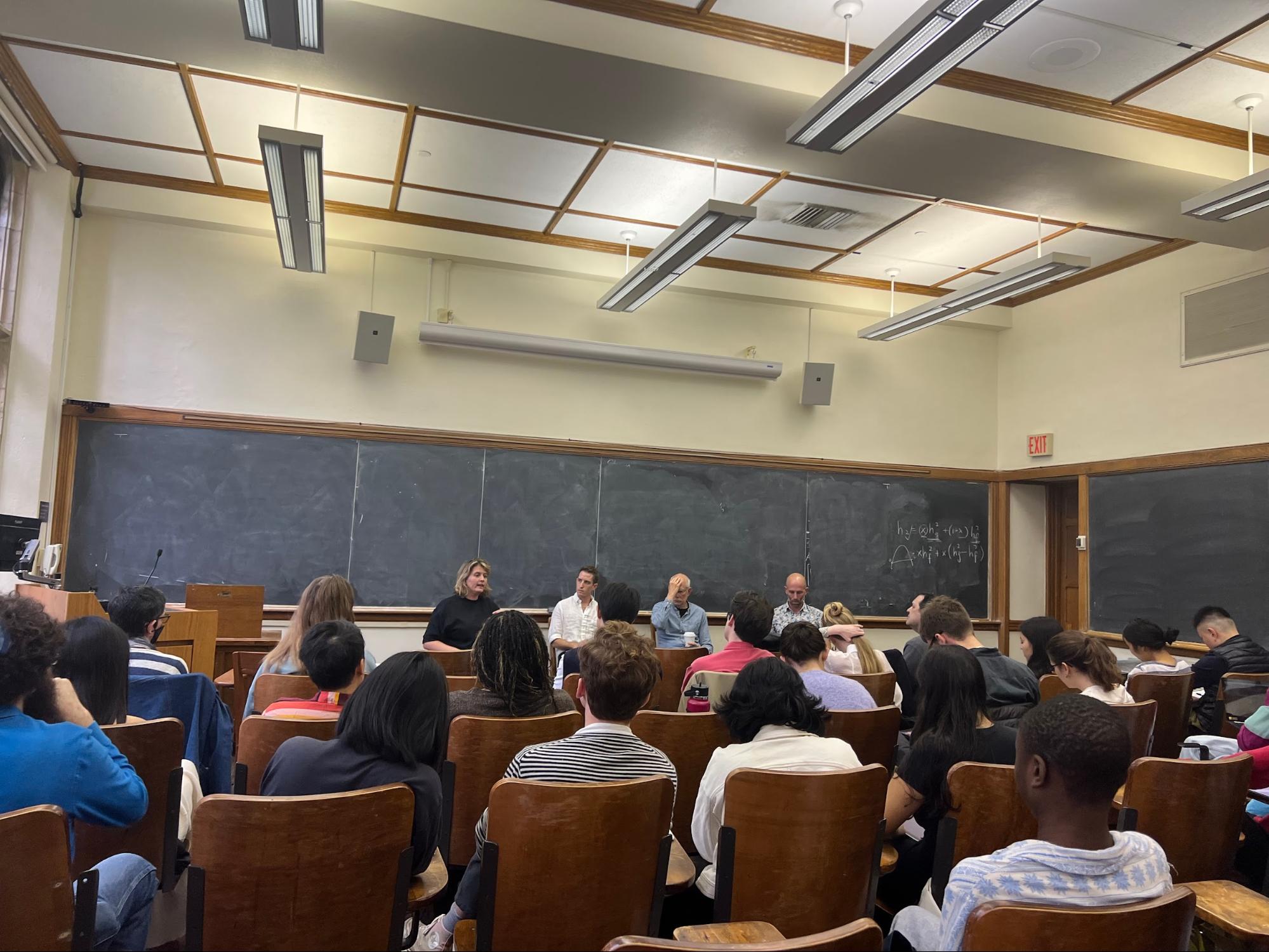French feminist philosopher Manon Garcia discusses new book “Joy of Consent” with Yale community
Students and faculty gathered last week for a dialogue about sex, consent and philosophy between Manon Garcia and three philosophy and gender studies professors in advance of tomorrow’s U.S. release of her latest work.

Content warning: This column discusses sexual consent frameworks and includes a non-graphic reference to rape.
SHARE is available to all members of the Yale community who are dealing with sexual misconduct of any kind, including sexual assault, sexual harassment, stalking, intimate partner violence and more. Counselors are available any time, day or night, at the 24/7 hotline: (203) 432-2000.
Philosopher and author Manon Garcia joined Yale faculty last Thursday to discuss the challenges of intimacy — a topic she tackles in her forthcoming book, “Joy of Consent,” which comes out in the United States tomorrow.
Joining her in William L. Harkness Hall were philosophy professors Stephen Darwall and Robin Dembroff as well as Women’s, Gender and Sexuality Studies professor Joseph Fischel, all of whom have authored philosophical texts on similar topics.
“It’s very provocative and very challenging, and I think there is now an archive of what we can call feminist consent studies, and it’s great to have it on the shelf,” Fischel said about “Joy of Consent.”
Garcia’s first book, “We Are Not Born Submissive,” was published in 2021 and translated from its original French into several languages. It examined the role of women in perpetuating patriarchal structures, citing Simone de Beauvoir and other feminist philosophers as ideological predecessors.
Garcia taught Directed Studies and graduate classes at Yale and now teaches practical philosophy at Freie Universität in Berlin. Some of Garcia’s previous Directed Studies students helped work on the English translation of “Joy of Consent” in a reading group.
Drawing on what she calls the “Tranasatlantic” consent conversation, Garcia hopes to bring a multinational perspective to consent frameworks and uses both French and American concepts of consent to inform her philosophies on intimacy.
To Garcia, it is crucial for power structures such as patriarchy and racism — which are globally pervasive and often implicit — to take as minimal of a role in the bedroom as possible, especially to reduce rates of unwanted sex.
“How can we think of what’s going on with these two people as equalizing rather than increasing the inequality?” she asked.
Garcia also spoke against the way the patriarchy interacts with respect during sex. She said that patriarchy has conditioned men to think they can be impolite during intimate acts, which further perpetuates inequality.
She encourages readers to think of consent not just as a legal question but as primarily a moral one. Her hope is that her book will shed new light on what consent can look like and on the pleasure it can bring to all parties involved.
Oliver Guinan ’25, formerly co-editor in chief of the Yale Daily News Magazine, told the News that he was impressed by the discussion; Guinan was also part of the group of Yalies who helped Garcia adapt the book for English-speaking readers.
“I really appreciate having Manon Garcia take consent, which can feel so sterile and legalistic, and refurbish this concept into something that can be positive for intimacy and positive for evaluating the will of one’s partner,” Guinan said.
Contrasting viewpoints and backgrounds from the Yale faculty members who joined Garcia animated the dialogue.
Fischel added layers to the conversation by incorporating the work of Immanuel Kant and other philosophers to consider sex through different perspectives.
“I appreciated how the speakers contextualized their philosophical discussion in terms of modern conservative rhetorical backlash against sexual liberation,” said William Archacki ’26.
During the talk, Garcia brought up alcohol’s role in consent. She said that many people have sex while intoxicated — but that this should not always be equated with rape.
Garcia also did not insist that intimacy should be entirely altruistic. She explained that she does not see selfishness and reciprocal benefit as mutually exclusive; rather, she sees both coexisting based on the satisfaction that comes from consent and collaboration.
“There is some form of selfishness in sex that is compatible with respect,” she said.
Though Garcia encourages consent, she thinks there could be a better alternative to strive toward.
Feminist philosophers have long been seeking a superior framework through which to consider sex, Garcia said, such as one based in desire or will.
“It’s not just women, or people that are victimized by men, that would have better sex lives in a more equal world,” Garcia said, suggesting that people of all genders stand to benefit from increased attention on sexual justice.
Belknap Press, an imprint of Harvard University Press, will publish the U.S. edition of “Joy of Consent” on Tuesday, Oct. 3.







